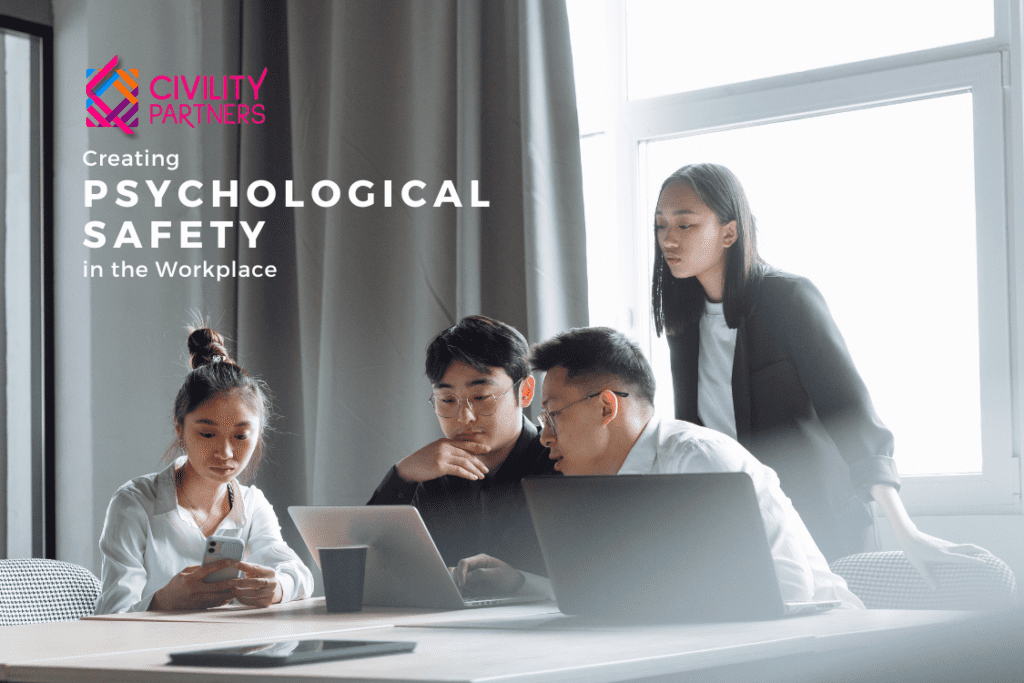Psychological safety in the workplace is the cornerstone of a positive and productive culture. “Psychological safety is the belief that one will not be punished or humiliated for speaking up with ideas, questions, concerns, or mistakes.”
To build and manage high-performing teams, leaders must actively work to create an environment where individuals feel safe to express their ideas, opinions, and concerns without fear of negative consequences.
Take a look at your company. Do people feel safe giving each other feedback, or do you have a culture of shame, blame, and gossip?
Creating psychological safety in the workplace
Here are three ways to create a culture of psychological safety.
Set the stage
As a leader of a team, it’s important to set the stage for psychological safety by creating a shared identity among team members and providing structure for them to feel safe in their work.
This includes fostering a sense of their individual contribution and cohesion as a team, and being open and transparent about any challenges or uncertainties that may arise.
Additionally, it’s crucial for the leader to role-model vulnerability and show their humanity in order to establish credibility and trust where team members feel comfortable being open and honest in return. Don’t be a “Do as I say, not as I do” kinda boss.
Invite participation
To foster a culture of participation and inclusivity, it’s important to be intentional and creative in inviting diverse perspectives and ideas. This can be done by actively seeking input from team members through open-ended questions, instead of directing them on what to do.
Psychologically safe space is a courageous space where people feel safe dissenting opinions and delivering constructive criticism, by inviting participation and encouraging individuals to challenge and question ideas, which ultimately leads to stronger culture. The opposite of courage isn’t cowardice; it’s conformity. And conformity is where innovation goes to die.
Respond productively
Finally, the most critical element that leaders often forget is to acknowledge and respond appropriately to team members who have mustered the courage to speak up and express their ideas or concerns.
The way in which you address their input sets the tone for future communication and encourages them and others witnessing this interaction to continue taking risks and speaking up in the future.
Show them that you value their input and take their concerns seriously. Practicing these skills and regularly discussing psychological safety within the team can help prevent a single negative comment from undermining the overall sense of safety for everyone.
Conclusion
Psychological safety, just like authenticity, isn’t a permanent state but rather is constantly being created and reinforced through the actions and behaviors of team members. It can be easily undermined by a single negative comment or action, and it’s the responsibility of the team leader and members to continuously build and maintain it.
In other words, psychological safety is an ongoing process that requires constant attention and effort to foster and maintain, just as authenticity is determined by one’s choice to be authentic in each moment.
Sincerely,
The Civility Partners Team
PS: Are you ready to take your team’s performance to the next level? We have an exciting opportunity for you. We’re giving away a FREE resource, a webinar on “Creating and Measuring Psychological Safety” on March 15th, 10AM Pacific, with our Director of Learning and Development, Anya Soto!
This webinar is worth 1 SHRM PDC for all live attendees. Don’t miss out on the opportunity to learn and improve your team’s performance and culture!
Written by: Jennifer Areola



